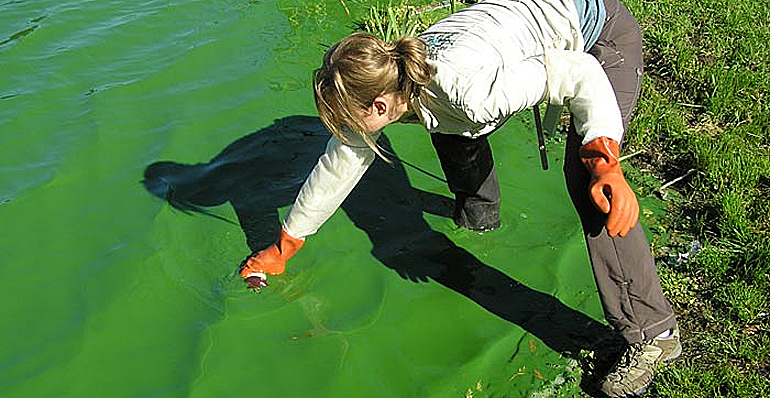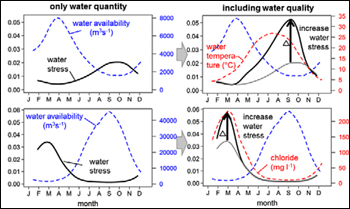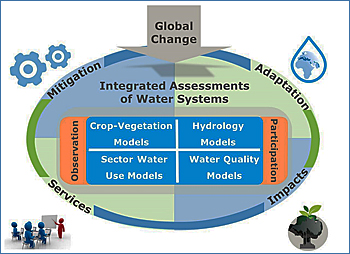Rethinking water scarcity: Study shows need to include water quality in assessment
 ‘We must bear in mind that water resources for different uses will not only need to account for demand in water quantity, but also in water quality’, warns researcher Michelle van Vliet of the Water Systems and Global Change (WSG) group of Wageningen University.
‘We must bear in mind that water resources for different uses will not only need to account for demand in water quantity, but also in water quality’, warns researcher Michelle van Vliet of the Water Systems and Global Change (WSG) group of Wageningen University.
Van Vliet is lead author of an article published in Nature Geoscience on 9 October, titled ‘Quality matters for water scarcity’.
More water scarcity
‘Water scarcity is expected to worsen considerably in many regions in the coming decades’, Michelle van Vliet explains.
She warns that the situation can get even worse as normally water scarcity is based on quantities. The study shows that a poor water quality can decrease the availability much further.
Van Vliet proposes a new approach to estimating water scarcity that includes relevant water quality requirements per sector.
 Two top diagrams show the classical scarcity of cooling water (left) and the scarcity when the (higher) temperature of the water is included. The lower diagrams show the classical agricultural water (left) and the scarcity when the chloride concentration is included.
Two top diagrams show the classical scarcity of cooling water (left) and the scarcity when the (higher) temperature of the water is included. The lower diagrams show the classical agricultural water (left) and the scarcity when the chloride concentration is included.
Different requirements
‘Quality requirements for water depend on the intended use, such as water temperature, salinity, nutrients and other pollutants. For example, water temperature is a critical parameter for cooling water use by thermoelectric power plants.’
For agricultural and domestic water use there are other pollutions that can intensify water scarcity. ‘For irrigation and domestic applications, salinity, nutrient and other pollutant levels pose more important constraints on usability. So it is essential to focus on the availability of water of suitable quality for specific sectors in water scarcity assessments’, Van Vliet adds.
Higher demand, more pollution
Today, one-third of the world population lives in areas of severe water scarcity or water stress and a growing global human population will place further demands on water supplies.
However, both the availability and the quality of water resources will be affected by socio-economic and technological developments, climate change and increasing climate extremes such as droughts and floods.
Urbanization and increasing volumes of untreated wastewater from households, industry and agriculture are all set to contribute to water quality deterioration, particularly in developing countries.
Rethinking water scarcity
To obtain more appropriate estimates of current and future water scarcity for policy support and water management, the authors of the study published in Nature Geoscience argue that we should shift our focus to the availability of water of acceptable quality for use in each sector, rather than looking merely at water quantity.
For example, they found that including just water temperature in assessments of water scarcity leads to an increase in percentage of the world population under severe water scarcity from 34% to 37%, compared to assessments of only water quantity.
And that is with just water temperature as quality parameter. And there are much more quality parameters critical for different water uses: salinity, nutrients, organic pollutants, pathogens, and other pollutants that could be included in this new concept for water scarcity.
 Integrated research by Water Systems and Global Change Group.
Integrated research by Water Systems and Global Change Group.
About Water Systems and Global Change (WSG) group
Michelle van Vliet is a member of the Water Systems and Global Change (WSG) group of Wageningen University.
This group aims to improve the understanding of anthropogenically driven changes in water cycles in relation to interactions between climate-, water-, energy- and agricultural systems.
It identified four main research lines: Land-water-climate interactions, Water-food-energy nexus, Adaptive planning and design and Water pollution assessments.
Additionally the group focusses it research on two areas of cross-cutting issues: Future water stress and Climate-water services.
This news item was originally published on the website of Wageningen University.
Read also on this website
● ‘Upstream water management interventions push scarcity downstream’, 20 June 2017
● Degradation of wetlands in the Sahel drives massive migration to Europe, 4 May 2017
● Amsterdam International Water Week 2017: Showing leadership in finding solutions to address water and 9 billion people, 24 May 2017
More information
Wageningen University
Water Systems and Global Change (WSG) group
Wageningen, the Netherlands
+31 317 484 190
www.wur.nl/en/wsggroup



